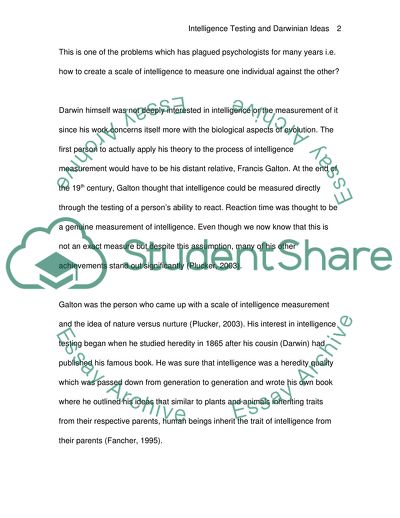Cite this document
(Intelligence Testing and Darwinian Ideas Essay Example | Topics and Well Written Essays - 1750 words, n.d.)
Intelligence Testing and Darwinian Ideas Essay Example | Topics and Well Written Essays - 1750 words. https://studentshare.org/biology/1703538-to-what-extent-did-darwinian-ideas-about-natural-selection-influence-the-development-and-use-of-intelligence-testing-in-the-first-half-of-the-twentieth-century
Intelligence Testing and Darwinian Ideas Essay Example | Topics and Well Written Essays - 1750 words. https://studentshare.org/biology/1703538-to-what-extent-did-darwinian-ideas-about-natural-selection-influence-the-development-and-use-of-intelligence-testing-in-the-first-half-of-the-twentieth-century
(Intelligence Testing and Darwinian Ideas Essay Example | Topics and Well Written Essays - 1750 Words)
Intelligence Testing and Darwinian Ideas Essay Example | Topics and Well Written Essays - 1750 Words. https://studentshare.org/biology/1703538-to-what-extent-did-darwinian-ideas-about-natural-selection-influence-the-development-and-use-of-intelligence-testing-in-the-first-half-of-the-twentieth-century.
Intelligence Testing and Darwinian Ideas Essay Example | Topics and Well Written Essays - 1750 Words. https://studentshare.org/biology/1703538-to-what-extent-did-darwinian-ideas-about-natural-selection-influence-the-development-and-use-of-intelligence-testing-in-the-first-half-of-the-twentieth-century.
“Intelligence Testing and Darwinian Ideas Essay Example | Topics and Well Written Essays - 1750 Words”. https://studentshare.org/biology/1703538-to-what-extent-did-darwinian-ideas-about-natural-selection-influence-the-development-and-use-of-intelligence-testing-in-the-first-half-of-the-twentieth-century.


